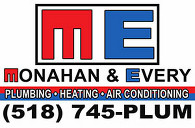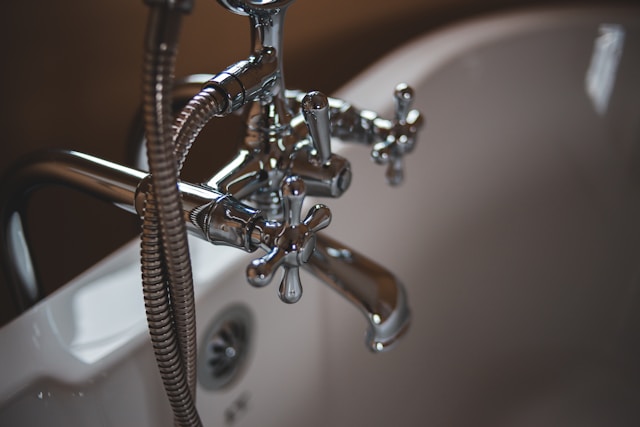

Call ME For All Your Plumbing and Heating Needs

Call Us For Free Estimates
Precision Plumbing: How Monahan & Every Replaces Galvanized Pipes in Pre-1970 Glens Falls Homes
When replacing galvanized pipes in pre-1970 Glens Falls homes, you need to understand why these pipes fail and how to spot the warning signs, such as low water pressure and rust-colored water. You’ll also face unique challenges, like preserving historic interiors and complying with New York plumbing codes. Monahan & Every uses modern materials like PEX and copper, executing a precise 7-step process that includes pipe mapping, targeted access, and system flushing to guarantee a seamless upgrade.

Why Galvanized Pipes Fail and How to Spot the Warning Signs
If you notice rusty or discolored water coming from your taps, it’s a clear sign that your galvanized pipes are failing. Low water pressure and fluctuating pressure levels are also indicators that corrosion is narrowing the pipe passages. Additionally, visible rust around pipe joints, misshapen pipes, and the presence of lead in your water are critical warnings that it’s time to replace your galvanized pipes.
Indicators like rusty water, low pressure, and pipe age that suggest a replacement is needed
Galvanized pipes in pre-1970 homes often exhibit telltale signs that indicate it’s time for a replacement. If you notice rusty water coming from your faucets in Glens Falls, it’s a clear sign of pipe deterioration. Low water pressure is another indicator, as is the age of the pipes themselves. Frequent leaks and visible corrosion also signal the need for galvanized pipe replacement. A whole-home repiping, including a plumbing system flush, may be necessary to restore your water quality and pressure.
The Unique Challenges of Upgrading Plumbing in Historic Glens Falls Homes
When upgrading the plumbing in your historic Glens Falls home, you’ll face unique challenges such as maneuvering around hidden pipes that may be hard to access, dealing with mixed materials that can complicate the replacement process, and preserving the original architectural finishes to maintain the home’s historical integrity. These issues require careful planning and precision to avoid damaging the home’s structure. By understanding these challenges, you can better prepare for a successful plumbing upgrade.
Navigating hidden pipes, mixed materials, and preserving original architectural finishes
Transversing hidden pipes in historic homes presents a significant challenge, especially when dealing with mixed materials like the galvanized steel pipes common in pre-1970 constructions. When upgrading the plumbing in your pre-1970 home, hidden pipe detection is essential. Monahan & Every guarantees plumbing code compliance in NY and preserves historic finishes, making the old home plumbing upgrade seamless and compliant.
Modern Piping Materials That Replace Galvanized Lines
When replacing galvanized pipes in your historic Glens Falls home, you have several modern piping materials to evaluate, each with its own set of pros and cons. PEX piping is highly flexible, cost-effective, and resistant to freezing and corrosion, but it may not be suitable for outdoor use due to its susceptibility to UV damage. In contrast, Type L copper piping offers durability and longevity, though it is more expensive and requires soldering, while CPVC pipes are another option, known for their resistance to corrosion and ease of installation, but they can be more rigid than PEX.
Comparison of PEX, Type L copper, and CPVC options with pros and cons for each
Replacing galvanized pipes in pre-1970 homes involves choosing between PEX, Type L copper, and CPVC, each with its own set of pros and cons. For PEX plumbing in Glens Falls, you get flexibility and ease of installation, but it may degrade with chlorinated water. Type L copper pipes are durable and resistant to high temperatures, but they can corrode and are costly. CPVC plumbing offers strong joint strength and corrosion resistance, but it’s more expensive and has thermal expansion issues. After the repipe, consider plumbing audit services and water filtration for ideal results.
How Monahan & Every Executes a Precision Pipe Replacement
When replacing galvanized pipes in your pre-1970 Glens Falls home, Monahan & Every Plumbing & Heating LLC follows a meticulous 7-step process. This process starts with a thorough pipe audit to identify areas needing replacement, ensuring that all unique problems are addressed. By mapping the pipes, targeting specific access points, and performing system flushing, the team minimizes disruption to your historic home’s interiors while ensuring compliance with New York plumbing codes and preservation guidelines.
A 7-step process from pipe audits to wall repairs that minimizes disruption and maximizes results
To guarantee a seamless and efficient replacement of galvanized pipes in pre-1970 homes, Monahan & Every Plumbing & Heating LLC employs a meticulous 7-step process. You start with a thorough pipe mapping to identify all galvanized steel pipes. Next, targeted access points are created to minimize disruption. The team then performs spot pipe repair where necessary, using PEX crimp and expansion tools for precise installations. After replacing the pipes, the system is flushed to ascertain clarity. Finally, any wall repairs are made to restore your home’s original condition, all in compliance with New York plumbing codes and preservation guidelines.

